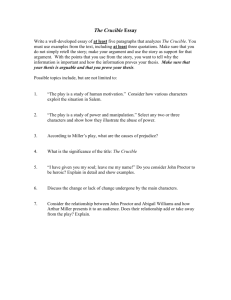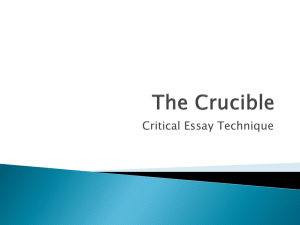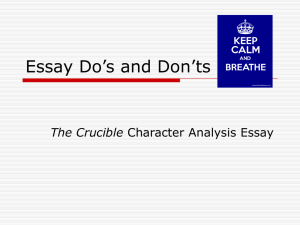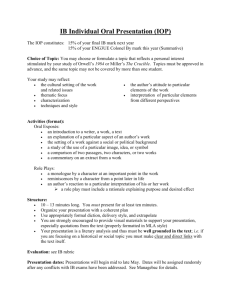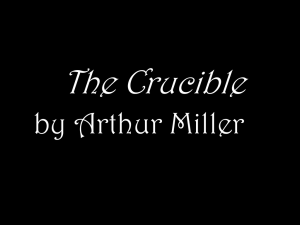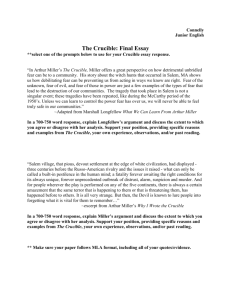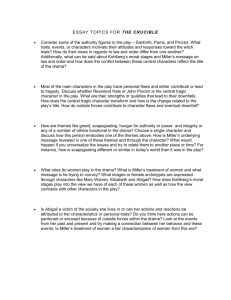Trials and torments
advertisement
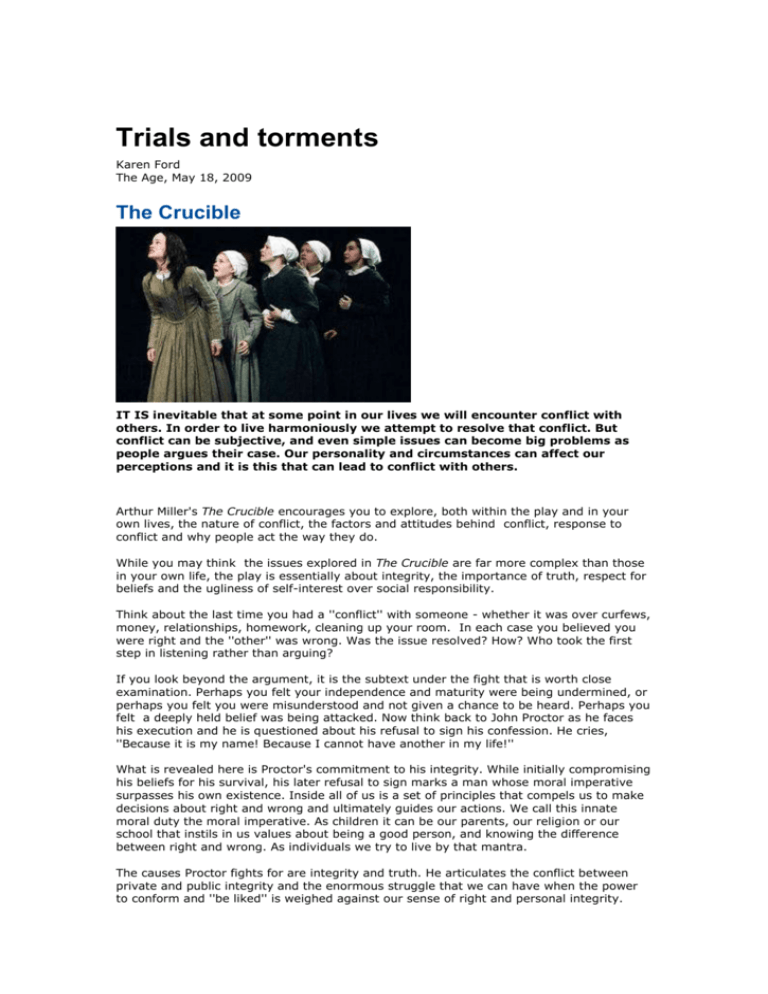
Trials and torments Karen Ford The Age, May 18, 2009 The Crucible IT IS inevitable that at some point in our lives we will encounter conflict with others. In order to live harmoniously we attempt to resolve that conflict. But conflict can be subjective, and even simple issues can become big problems as people argues their case. Our personality and circumstances can affect our perceptions and it is this that can lead to conflict with others. Arthur Miller's The Crucible encourages you to explore, both within the play and in your own lives, the nature of conflict, the factors and attitudes behind conflict, response to conflict and why people act the way they do. While you may think the issues explored in The Crucible are far more complex than those in your own life, the play is essentially about integrity, the importance of truth, respect for beliefs and the ugliness of self-interest over social responsibility. Think about the last time you had a ''conflict'' with someone - whether it was over curfews, money, relationships, homework, cleaning up your room. In each case you believed you were right and the ''other'' was wrong. Was the issue resolved? How? Who took the first step in listening rather than arguing? If you look beyond the argument, it is the subtext under the fight that is worth close examination. Perhaps you felt your independence and maturity were being undermined, or perhaps you felt you were misunderstood and not given a chance to be heard. Perhaps you felt a deeply held belief was being attacked. Now think back to John Proctor as he faces his execution and he is questioned about his refusal to sign his confession. He cries, ''Because it is my name! Because I cannot have another in my life!'' What is revealed here is Proctor's commitment to his integrity. While initially compromising his beliefs for his survival, his later refusal to sign marks a man whose moral imperative surpasses his own existence. Inside all of us is a set of principles that compels us to make decisions about right and wrong and ultimately guides our actions. We call this innate moral duty the moral imperative. As children it can be our parents, our religion or our school that instils in us values about being a good person, and knowing the difference between right and wrong. As individuals we try to live by that mantra. The causes Proctor fights for are integrity and truth. He articulates the conflict between private and public integrity and the enormous struggle that we can have when the power to conform and ''be liked'' is weighed against our sense of right and personal integrity. No doubt you will discuss Miller's construction of the play as an allegory for the McCarthy congressional hearings of the 1950s into un-American activities. The idea that people should prove their loyalty to the US by swearing in a court is reflected in the play where the inhabitants of Salem are forced to prove their allegiance to God, and thus society. Miller is not so concerned with individuals and how fear can compromise their integrity as he is with challenging the powers that insist we must act in a particular way to be accepted. Indeed, Miller's play demands that we question any society or group in which conforming to a religious, moral, social or political code is decreed. Such blind faith is to be condemned for its abuse of individual conscience and destruction of personal choice. The Crucible is not just about the conflict one man has with his integrity. Consider also how the play deals with and explores conflict with notions of justice, conflict with notions of truth, conflict with fear, and what can happen to people when fear motivates action rather than reason. Miller's play is relevant to us all as it highlights how conflict will be inevitable when the desire for the self overrides the desire and welfare of the collective - in other words, when your needs are more important than anyone else's, or the world around you. In addition, conflict arises when your own insecurities and paranoias influence your actions. Have you ever been party to - or witnessed - bullying of an individual because you didn't want to lose friends or be picked on yourself? Or what about when the fear of punishment leads you to lie? Now think about what Proctor means when he says, ''There are them that will swear to anything before they'll hang; have you never thought of that?'' Think about Mary Warren. Her youth and desire to be accepted result in her lying. She is easily manipulated and intimidated, and in her we see how the quest for social acceptance leads to conflict. Largely an innocent, she is the sort of girl who would do what the ''bully'' demanded if it meant being accepted. We are all human and we all make mistakes. Proctor's adultery is testimony to his fallibility. The play, like the broader context, is not meant to make us feel guilty or ashamed of our weaknesses. The central idea of conflict is to encourage us to reflect on our beliefs and actions and see how they reflect our fundamental belief in what we know to be right and just. While the play is highly theatrical and stylised, the views and values espoused by Miller are basic and achievable - tolerance, understanding and knowledge are essential to avoiding conflict. Understanding that others have views that may not align with ours does not mean they are ''wrong'' or that they should be condemned. Finally, think about the title of the play and how a crucible is a vessel or huge pot placed on a fire to melt metals. Within it is different matter, all blending together under pressure. We all live in a ''crucible'', a ''melting pot'', a society where difference is inevitable. This does not mean that we cannot ''blend'' - just that to do so we need to be tolerant, flexible and consider our contribution to the bigger picture. We alone are not the centre of the universe. Karen Ford is a lecturer, Melbourne Graduate School of Education, University of Melbourne. Torn by trials and tribulations Paul Byrne The Age, Education -- Monday, October 27, 2008 Internal struggles are at the heart of Arthur Miller's play, writes Paul Byrne. Internal struggles are at the heart of Arthur Miller's play, writes Paul Byrne. CONFLICT, we are often told, is considered a normal part of life but it is something most people would rather avoid. Conflict is the essence of drama. Without it films and theatre would not be worth watching. Conflict - verbal or physical - is essential in getting the audience involved, because it is conflict that propels the action forward. For audience involvement to be sustained, however, it must go beyond these two elements. Effective conflict must also be internalised, with characters struggling against their worse natures or inner demons. In his fictionalised portrayal of people and society during the witch trials in the theocracy of Salem in 1692, Arthur Miller has given us the full spectrum of characters - from the most demonic to the saintly. In The Crucible we see people who struggle as much with themselves as they do with their neighbours. Conflict, as playwright Rib Davis says, implies choice. "When there is conflict, we, the audience, are invited to take sides." Sometimes taking sides is made even easier when Miller doesn't mince words in describing the characters that he disdains and those he admires or sympathises with. From the outset, Miller's contempt for the local minister Reverend Parris is readily apparent. Parris is described as a man who "in history ... cut a villainous path, and there is very little good to be said of him". Abigail Williams has an endless capacity for dissembling and Thomas Putnam has a "vindictive nature (which) was demonstrated long before the witchcraft began". Later, in act four, when Judge Hathorne and Deputy Governor Danforth appear for the first time in the vestry room of the Salem meeting house, Hathorne is described as a "bitter, remorseless Salem Judge". Surprisingly, the description of Danforth seems somewhat milder but this is deceptive. He is described "as a grave man in his 60s of some humour and sophistication that does not, however, interfere with an exact loyalty to his position and cause". It is only at the end of the play that we fully realise the implications of Miller's understatement. "Danforth's exact loyalty to his position and cause" results in untold human misery and suffering for the people of Salem. In describing those characters we can happily side with, Miller's language is sympathetic and affirming. Proctor on his entrance is described as a man who "had a sharp and biting way with hypocrites" as well as being "powerful of body, even tempered, and not easily led". We know from this description that conflict will be unavoidable when Proctor confronts the likes of those mentioned above. And in describing the elderly and esteemed Rebecca Nurse, Miller tells us that "the general opinion of her character was so high that to explain how anyone dared cry her out for a witch ... we must look to the fields and boundaries of that time". This refers to the battle for land that lies at the heart of many of the destructive accusations that people such as Thomas Putnam made against innocent people. Miller does not describe Elizabeth Proctor at all on her entrance in act two. Instead the playwright reveals her through her dialogue and actions. Elizabeth initially strikes the audience as passive (her kowtowing to Mary Warren is an example) and she seems quick to sense any faltering in Proctor's rejection of Abigail Williams. But by the play's end, her loyalty to her husband is unflinching. Just as Miller portrays characters in different ways in both sides of this conflict, so he adds levels of complexity when portraying the inner conflicts of two characters in particular. Reverend Hale is the only character who moves from seemingly unshakeable conviction at the play's outset to doubt at the end. In the beginning of the play Hale sees in his books "the Devil (who) stands stripped of all his brute disguises". But in the final scenes Hale sees his own hand in the human devastation he has wrought in Salem by the numerous death warrants he has signed including that of the saintly Rebecca Nurse. As he says, "where I turned the eye of my great faith, blood flowed". On the other hand, Proctor's internal conflict works on two levels. First he berates himself needled somewhat by his wife Elizabeth - for his heated sexual encounters with Abigail Williams. When he admits his adultery to the court to expose Abigail in act three, Francis Nurse reacts with horror and Proctor, taking a dark view of his own soul, tells Francis: "I wish you had some evil in you that you might knowme!" Then there is Proctor's much greater internal struggle. He could save his life and be with his now pregnant wife Elizabeth. All he must do is lie to the court and say that he had seen the devil. Miller cranks up the tension by Proctor admitting guilt and then signing his confession, even saving some face by refusing to name names in the process. But when he refuses to give Danforth the signed confession, we know he is doomed. Yet by this action Proctor finally resolves this internal struggle. Before he mounts the gallows he says: "You have your magic now, for now I do think I see some shred of goodness in John Proctor." The Crucible has long been seen as an analogy for the injustices that the House UnAmerican Activities Committee wrought on the political and cultural life of America in the late 1940s and beyond. Yet in Miller's portrayal of this sad and sorry part of history The Crucible still stands solidly on its own merits, due in no small part to the levels of conflict that Miller has so skilfully and powerfully interwoven. Paul Byrne is a teacher librarian at Williamstown High School.
